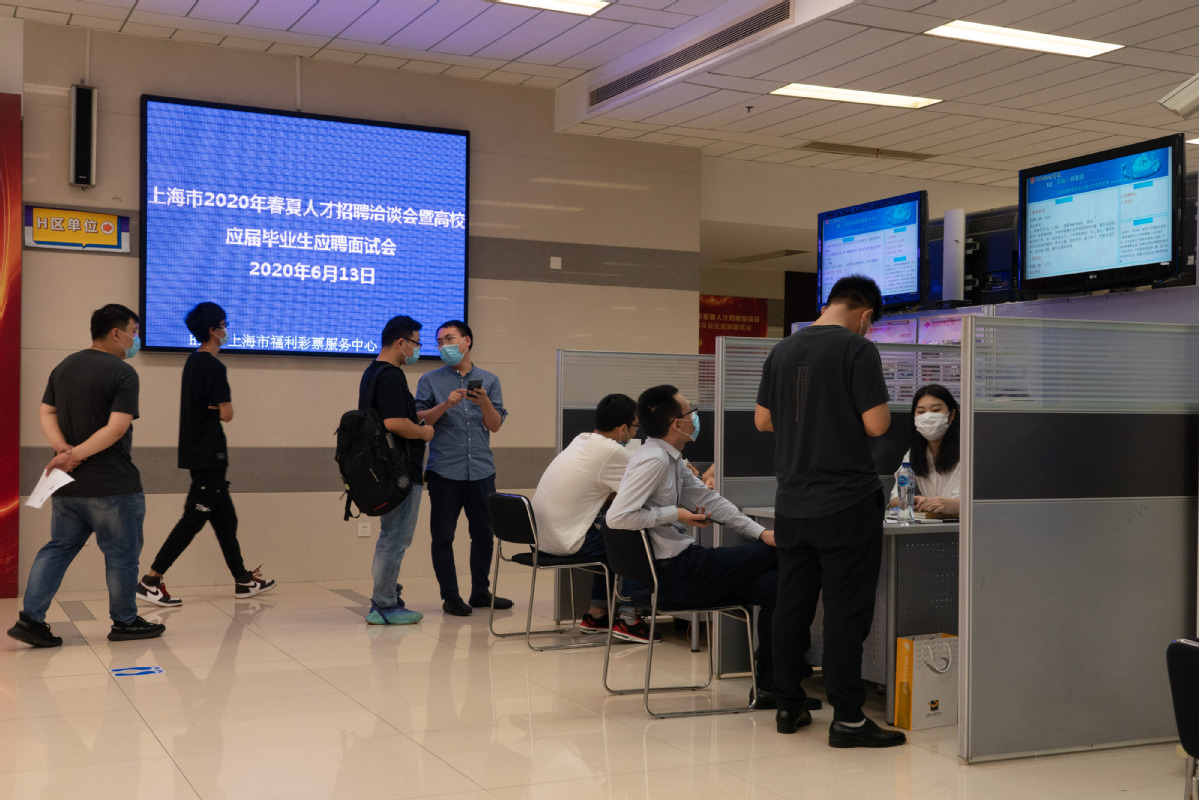Increasing demand best way to boost employment
By Sun Wenkai | China Daily | Updated: 2020-07-08 07:11

The novel coronavirus outbreak has had a serious impact on China. In fact, the Chinese economy contracted by 6.8 percent and the unemployment rate increased in the first quarter of this year as many enterprises suspended operations due to the stringent measures imposed to contain the spread of the virus.
Although a majority of Chinese enterprises have gradually resumed normal operations, many enterprises in the hotel, catering, transportation and entertainment sectors have not fully recovered. And a majority of small and medium-sized enterprises face shortage of financing.
Besides, since overall demand hasn't fully recovered, which has weakened some enterprises' operations, the unemployment rate could further increase even after the epidemic is basically contained. China's urban registered unemployment was 6.2 percent, 5.9 percent, 6.0 percent and 5.9 percent in February, March, April and May respectively, with the large number of migrant workers who have not been able to return to work in urban areas indicating a more serious unemployment problem. In addition, more than 8 million students are expected to graduate from college this year, increasing the pressure on the job market.
Given these challenges, the central government has taken special measures to increase employment and improve people's livelihoods, including implementing policies to expand domestic demand. Helping market players, especially micro and small-sized businesses, is an important way of increasing employment and improving people's livelihoods. And the best way to achieve that goal is to reduce taxes and fees, and provide financial support to those enterprises.
On the fiscal front, the authorities should reduce the tax rate and social security premium, and implement other favorable tax and fee policies for micro, small and medium-sized enterprises. Also, the tax and fee reduction policies should be further expanded in light of the epidemic, particularly for the micro and small enterprises.
The government should provide direct subsidies for such enterprise, too. According to our (Renmin University of China's School of Economics) research, these favorable tax and fee policies will reduce the economic burden of micro and small enterprises and enhance their capacity to cope with the epidemic situation, whereas policies including deferring the dates for enterprises to pay income tax and carry over their losses will boost their sustainable operation capability.
In other words, favorable tax and fee policies will help reduce micro and small enterprises' operation cost and boost their profit-making capability, and thus help them overcome the impact of the epidemic and reduce unemployment.
China's financial policy during the epidemic has been mainly focused on increasing loans for more enterprises. Favorable financial policies, especially inclusive financial policy, play a key role in boosting the real economy. In line with this policy, a majority of the loans have been given to labor-intensive industries with the aim of creating more jobs.
Fiscal and financial policies have played an important role in stabilizing employment during the epidemic. But fiscal policy still has room for improvement; for example, the government could give direct subsidies to certain enterprises. As for financial policy, in the next stage the government should use it to provide more support for the real economy so that enterprises in this sector can better cope with the increasing credit risks.
But economic recovery does not depend solely on government policy support. And since the financial deficit will widen due to the tax and fee reduction policies and an increase in financial expenditure, in the next stage the government should help the market to boost economic recovery.
Continuously expanding market demand is the best way to address the unemployment problem. Labor demand depends on the demand for products, both durable and perishable, and services. In general, China's economic development and job market were strong before the epidemic broke out, which shows the Chinese economy has great potential of recovery after the epidemic. Despite that, financial policy should be aimed at increasing demand further to expedite economic recovery.
The government should take measures to help enterprises in different sectors, especially in the service sector, which employ a large number of workers, to resume normal operations. It should also reduce market restrictions and take measures to accelerate the economic cycle by further deepening reform and opening-up.
Migrant workers and college graduates face the biggest challenge in getting jobs. In order to ensure an increasing number of migrant workers get employment, the government should encourage enterprises to resume normal production in labor-intensive industries and increase social security. And to ensure college graduates find jobs, the government should facilitate a big increase in the posts for interns and ensure they receive substantial stipends, so as to increase the transitional employment rate, and increase enrollments in postgraduate courses to keep the unemployment rate low.
The author is a professor at the School of Economics, Renmin University of China.
The views don't necessarily reflect those of China Daily.
























